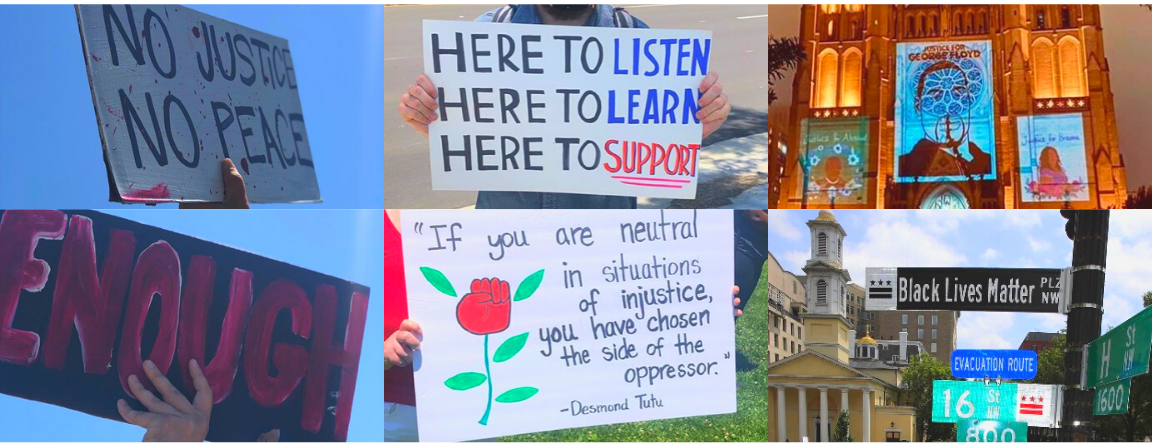Countering Racism, Building Community
Active programs and resources within the Diocese of Los Angeles and the wider Episcopal Church

Martin Luther King Jr. Day Commemoration | Jan. 16, 2021
On January 16, 2021, The Rev. Gayle Fisher-Stewart, author and former police officer, offered the keynote presentation for the 2021 diocesan commemoration of MLK Day under the theme “Where Do We Go From Here: Chaos or Community,” drawn from the title of Dr. King’s last book, published in 1967.
The event was sponsored by the diocese’s Program Group on Black Ministries and the H. Belfield Hannibal Chapter of the Union of Black Episcopalians. Planners include Bishop Suffragan Diane M. Jardine Bruce, Canon Suzanne Edwards Acton, the Rev. Guy Leemhuis, the Rev. Margaret McCauley, Stacey Forte-Dupré, Pamm Land, Melissa Hayes and Canon Chas Cheatham, director of the Episcopal Chorale, which provides music for the program.

A series of webinars examining systems of oppression in church and society presented by New Community, the Diocese of Los Angeles’ multicultural ministry, and Bishop Suffragan Diane M. Jardine Bruce.
Video of the introductory webinar (August 22, 2020) is here.
- Introduction to Doctrine of Discovery presentation
- Introduction to Racial Identity presentation
- Racial Identity schemas handout
- Introduction to Racial Capitalism presentation
Video of the second webinar, Doctrine of Discovery (Sept. 26) is here.
Doctrine of Discovery presentation (English)
La Doctrina del Descubrimiento presentación (español)
Presented by the Rev. Canon Mary Crist and the Rev. Fennie Chang. The Doctrine of Discovery, established by European governments and ratified by early United States policy, held that the claims of European Christians took precedence over those of Indigenous peoples throughout the world, launching five centuries of human rights violations. The Episcopal Church repudiated the doctrine in 2009, yet it lives on through the church’s laws, systemic racism, and historical trauma. New Community is working to discover the untold truths in order to work together for change and to build Christ’s beloved community.
Racial Identity (Oct. 3)
Video of this presentation is not yet available.
Internalized Oppression presentation by Carlos Morrison: slides and script
Full Packet Racial-Ethnic ID Models (Sandra Chapman Consulting)
Presented by Canon Suzanne Edwards-Acton, the Rev. John Limo, the Rev. Carlos Ruvalcaba, and Gayle Kawahara. Although race has no scientific basis in biological or genetic reality, it is nevertheless a very real social construct intentionally designed to separate people into perpetual power hierarchies of superiority and inferiority. Whether or not individuals are aware of it, want it, or feel they have it, racial identity — especially in the deeply racialized history and culture of the United States, greatly affects all human experience. Racial identity is both externally imposed and internally constructed, and is crucial to understanding how people’s identities and experiences have been shaped by race.
At What Co$t? Asian Pacific Americans, Racial Capitalism and the American Dream (Oct. 17)
Saturday, October 17, 1 – 3 p.m.
Cosponsored by The Gathering – A Space for Asian Pacific American Spirituality (Diocese of Los Angeles) and Episcopal Asian Supper Table (Diocese of New York). Featuring Jonathan Tran, Ph.D., associate professor of philosophical theology, and George W. Baines, chair of religion, Baylor University; with respondents (TBA). Racial capitalism is a development of economic, political and social systems of oppression, formed by exploiting division between racial and cultural groups. These systems, sustained through power dynamics, are less likely to be seen as overt forms of racism and are instead demonstrated as hegemonic undercurrents. They exist in most systems of economy, including the church. Dr. Tran will explore the past and present implications of racial capitalism on Asian Pacific Americans as well as how the church can respond to bring about change toward racial justice. More about this topic from Dr. Tran is here.
My Work to Do
An online affinity group designed to help white people build stamina for discussing racism, systemic injustice, racial healing, reconciliation, and justice in their everyday lives. Black, indigenous and other people of color allies are welcome with an understanding this is a white-centered (and therefore not always safe) space. We invite those feeling lost or overwhelmed into the conversation, especially white people who might not have a local anti-racism program or accessible discussion happening in their lives. To learn more and to register, visit the website here.
The Kaleidoscope Institute
Founded in 2006 by the Rev. Eric H.F. Law to help build sustainable communities by addressing race and diversity issues in faithful and constructive ways through a system of practices, models, theology and skill sets. Learn more here.
One in the Spirit
Staffed by the Rev. Canon Susan Russell, canon for Engagement Across Difference, and led by a diverse steering committee, One in the Spirit is a diocesan wide initiative focused on increasing our capacity to expand relationships and deepen connections across differences in order to strengthen our shared commitment to follow Jesus. A response to the increasing polarization and deepening divisions in our church, our nation and our world, it is committed to equipping us to recover our deep connection to each other and to our world so we can participate more fully in the transforming work of love. Learn more here.
The Gathering: A Space for Asian Pacific American Spirituality
A ministry of the Episcopal Diocese of Los Angeles that provides opportunities for Asian Pacific Americans (APAs) to gather together to tell our stories, learn from one another, engage in initiatives for peace and social justice, and talk about spirituality in the APA context. Learn more here.
The Absalom Jones Center
The Center, based in Atlanta, Georgia, strengthens The Episcopal Church’s commitment to reach across the borders and boundaries that divide the human family of God. Center programs provide parishes and dioceses around the world with support to address racism head-on through racial reconciliation and healing. Learn more here.
Becoming Beloved Community (The Episcopal Church)
As the Episcopal branch of the Jesus Movement, we dream and work to foster Beloved Communities where all people may experience dignity and abundant life and see themselves and others as beloved children of God. The Becoming Beloved Community Vision Document and accompanying resources help us to understand and take up the long-term commitments necessary to form loving, liberating and life-giving relationships with each other. Together, we are growing as reconcilers, justice-makers, and healers in the name of Christ. Learn more here.
A Word to the Episcopal Diocese of Los Angeles
From Bishop John Harvey Taylor
June 3, 2020
My siblings in Christ:
In the life of nations, moments come when the person of faith must ask: “What am I to do?”
Let’s go back to the 15th year of the reign of Emperor Tiberius. His proconsul, Pontius Pilate, ruled Judea, and his puppet, Herod, was king in Galilee. As we learn in the third chapter of Luke’s gospel, this was when John the Baptist came onto the scene, calling on the crowds to “bear fruits worthy of repentance.”
The crowds wanted him to be more specific. They said, “What then should we do?” John’s first answer was about personal ethics. He said that those who had a second coat or extra food should share them, making manifest their love of their neighbor.
The next two answers were to officials who lorded their power over oppressed people. In John’s time, the people coming down to see him at the Jordan River had neither constitution nor franchise. All they had was a prophet promising that God would punish tax collectors and soldiers who abused their authority.
Luke identifies these and John’s other exhortations as “good news,” which is to say gospel. After Herod killed John, our Lord and Savior Jesus Christ built his ministry on the framework the Baptist had built.
Opposition to the unjust use of power lies at the heart of our formation as Christians.
Read the full text in English and Spanish here.
From Bishop Suffragan Diane M. Jardine Bruce
July 13, 2020
‘Pray, and do something’ resources offer help to respond systemic racism
God,
Grant me justice, so that I may treat others as they deserve.
Grant me mercy, so that I don’t treat others as they deserve.
Grant me a humble walk with you, so that I may understand the difference.
— The Rev. Dr. Patricia McCaughan and the Very Rev. Keith Yamamoto
This prayer, written by two priests of this diocese, can be found on page 166 of the book Race and Prayer: Collected Voices Many Dreams, Malcolm Boyd and Chester Talton, editors.
I used this book a number of times when I was a parish priest, but hadn’t looked at it in the last few years. The violence and murder perpetrated at the hands of law enforcement and vigilantes on our black community, especially the “caught on tape” murder of George Floyd, moved me to pull this book off my shelf, dust it off, and pray.
Maybe you are in that same place as well. I need to pray, but I also know I need to DO something. The first thing I want to do is to apologize to you, my siblings in Christ right here in the Diocese of Los Angeles who have been living under and with the systems of injustice and white supremacy for centuries, and who feel the weight of that oppression every day of your lives.
